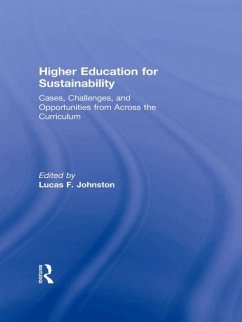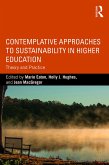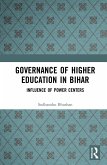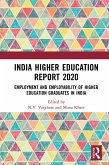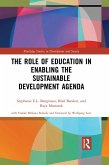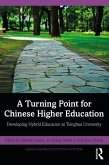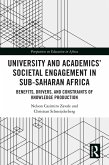Higher Education for Sustainability (eBook, PDF)
Cases, Challenges, and Opportunities from Across the Curriculum
Redaktion: Johnston, Lucas F.
51,95 €
51,95 €
inkl. MwSt.
Sofort per Download lieferbar

26 °P sammeln
51,95 €
Als Download kaufen

51,95 €
inkl. MwSt.
Sofort per Download lieferbar

26 °P sammeln
Jetzt verschenken
Alle Infos zum eBook verschenken
51,95 €
inkl. MwSt.
Sofort per Download lieferbar
Alle Infos zum eBook verschenken

26 °P sammeln
Higher Education for Sustainability (eBook, PDF)
Cases, Challenges, and Opportunities from Across the Curriculum
Redaktion: Johnston, Lucas F.
- Format: PDF
- Merkliste
- Auf die Merkliste
- Bewerten Bewerten
- Teilen
- Produkt teilen
- Produkterinnerung
- Produkterinnerung

Bitte loggen Sie sich zunächst in Ihr Kundenkonto ein oder registrieren Sie sich bei
bücher.de, um das eBook-Abo tolino select nutzen zu können.
Hier können Sie sich einloggen
Hier können Sie sich einloggen
Sie sind bereits eingeloggt. Klicken Sie auf 2. tolino select Abo, um fortzufahren.

Bitte loggen Sie sich zunächst in Ihr Kundenkonto ein oder registrieren Sie sich bei bücher.de, um das eBook-Abo tolino select nutzen zu können.
This edited collection provides a glimpse at the ways colleges and universities have integrated sustainability across the curriculum.
- Geräte: PC
- mit Kopierschutz
- eBook Hilfe
- Größe: 1.34MB
Andere Kunden interessierten sich auch für
![Contemplative Approaches to Sustainability in Higher Education (eBook, PDF) Contemplative Approaches to Sustainability in Higher Education (eBook, PDF)]() Contemplative Approaches to Sustainability in Higher Education (eBook, PDF)51,95 €
Contemplative Approaches to Sustainability in Higher Education (eBook, PDF)51,95 €![Governance of Higher Education in Bihar (eBook, PDF) Governance of Higher Education in Bihar (eBook, PDF)]() Sudhanshu BhushanGovernance of Higher Education in Bihar (eBook, PDF)44,95 €
Sudhanshu BhushanGovernance of Higher Education in Bihar (eBook, PDF)44,95 €![India Higher Education Report 2020 (eBook, PDF) India Higher Education Report 2020 (eBook, PDF)]() India Higher Education Report 2020 (eBook, PDF)44,95 €
India Higher Education Report 2020 (eBook, PDF)44,95 €![The Role of Education in Enabling the Sustainable Development Agenda (eBook, PDF) The Role of Education in Enabling the Sustainable Development Agenda (eBook, PDF)]() Stephanie E. L. BengtssonThe Role of Education in Enabling the Sustainable Development Agenda (eBook, PDF)42,95 €
Stephanie E. L. BengtssonThe Role of Education in Enabling the Sustainable Development Agenda (eBook, PDF)42,95 €![A Turning Point for Chinese Higher Education (eBook, PDF) A Turning Point for Chinese Higher Education (eBook, PDF)]() A Turning Point for Chinese Higher Education (eBook, PDF)37,95 €
A Turning Point for Chinese Higher Education (eBook, PDF)37,95 €![University and Academics' Societal Engagement in Sub-Saharan Africa (eBook, PDF) University and Academics' Societal Engagement in Sub-Saharan Africa (eBook, PDF)]() Nelson Casimiro ZavaleUniversity and Academics' Societal Engagement in Sub-Saharan Africa (eBook, PDF)42,95 €
Nelson Casimiro ZavaleUniversity and Academics' Societal Engagement in Sub-Saharan Africa (eBook, PDF)42,95 €![Higher Education Reform in China (eBook, PDF) Higher Education Reform in China (eBook, PDF)]() Higher Education Reform in China (eBook, PDF)45,95 €
Higher Education Reform in China (eBook, PDF)45,95 €-
-
-
This edited collection provides a glimpse at the ways colleges and universities have integrated sustainability across the curriculum.
Dieser Download kann aus rechtlichen Gründen nur mit Rechnungsadresse in A, B, BG, CY, CZ, D, DK, EW, E, FIN, F, GR, HR, H, IRL, I, LT, L, LR, M, NL, PL, P, R, S, SLO, SK ausgeliefert werden.
Produktdetails
- Produktdetails
- Verlag: Taylor & Francis eBooks
- Seitenzahl: 272
- Erscheinungstermin: 10. September 2012
- Englisch
- ISBN-13: 9781136336690
- Artikelnr.: 38450361
- Verlag: Taylor & Francis eBooks
- Seitenzahl: 272
- Erscheinungstermin: 10. September 2012
- Englisch
- ISBN-13: 9781136336690
- Artikelnr.: 38450361
- Herstellerkennzeichnung Die Herstellerinformationen sind derzeit nicht verfügbar.
Lucas F. Johnston is Assistant Professor of Religion and Environmental Studies and a Faculty Associate in the Center for Energy, Environment, and Sustainability (CEES) at Wake Forest University, USA.
Foreword: When You Wake Up Tomorrow, Paul Rowland
Chapter 1: Introduction: What's Required to Take EfS to the Next Level?
Dedee DeLongpre Johnston and Lucas Johnston
SECTION 1: Understanding the Landscape for Change
Chapter 2: The Emerging Environmental Sustainability Program at Meredith
College: Exploring Student and Faculty Interest and Participation, Laura
Fieselman and Erin Lindquist
Chapter 3: Understanding Student Environmental Interests When Designing
Multidisciplinary Curriculum, Jeremy T. Bruskotter, Greg Hitzhusen, Robyn
S. Wilson, Adam Zwickle
Chapter 4: Learning Outcomes: An International Comparison of Countries and
Declarations, Debra Rowe and Lucas Johnston
SECTION 2: Sustainability Across the Curriculum: Strategies and Tactics
Chapter 5: Systems Study of an International Masters Program: A Case from
Sweden, Sanaz Karim, Nadarajah Sriskandarajah, Asa Heiter
Chapter 6: Keys to Breaking Disciplinary Barriers that Limit Sustainable
Development Courses, William Van Lopik
SECTION 3: Educating the Professional
Chapter 7: Strategies for Transforming Healthcare Curricula: A Call for
Collaboration between Academia and Practitioners, Carrie Rich and Seema
Wadhwa
Chapter 8: Sustainability and Professional Identity in Engineering
Education, Mark Minster, Patricia D. Brackin, Rebecca DeVasher, Erik Z
Hayes, Richard House, Corey Taylor
Chapter 9: Implementing Environmental Sustainability in the Global
Hospitality, Tourism, and Leisure Industries: Developing a Comprehensive
Cross-Disciplinary Curriculum, Michelle Millar, Chris Brown, Cynthia
Carruthers, Thomas Jones, Yen-Soon Kim, Carola Raab, Ken Teeters, Li-Ting
Yang
SECTION 4: Problem-Based Learning
Chapter 10: Everybody's Business: Addressing the Challenge of Team-Teaching
Partnerships in the Global Seminar, Tamara Savelyeva
Chapter 11: The Moral Ecology of Everyday Life, James J. Farrell
Chapter 12: The Living Home: Building It into the Curriculum, Braum Barber
and Leona Rousseau
SECTION 5: Transformational Approaches
Chapter 13: Shaping Sustainability at Furman and Middlebury: Emergent and
Adaptive Curricular Models, Angela C. Halfacre, Michelle Horhota, Katherine
Kransteuber, Brittany DeKnight, Brannon Andersen, Jack Byrne, Steve
Trombulak, Nan Jenks-Jay
Chapter 14: Stepping Up to the Challenge-The Dalhousie Experience, Tarah
Wright
Chapter 15: Sustainability as a Transformation in Education, Charles L.
Redman
Chapter 16: Toward a Resilient Academy, Richard M. Carp
Epilogue
About the Contributors
Chapter 1: Introduction: What's Required to Take EfS to the Next Level?
Dedee DeLongpre Johnston and Lucas Johnston
SECTION 1: Understanding the Landscape for Change
Chapter 2: The Emerging Environmental Sustainability Program at Meredith
College: Exploring Student and Faculty Interest and Participation, Laura
Fieselman and Erin Lindquist
Chapter 3: Understanding Student Environmental Interests When Designing
Multidisciplinary Curriculum, Jeremy T. Bruskotter, Greg Hitzhusen, Robyn
S. Wilson, Adam Zwickle
Chapter 4: Learning Outcomes: An International Comparison of Countries and
Declarations, Debra Rowe and Lucas Johnston
SECTION 2: Sustainability Across the Curriculum: Strategies and Tactics
Chapter 5: Systems Study of an International Masters Program: A Case from
Sweden, Sanaz Karim, Nadarajah Sriskandarajah, Asa Heiter
Chapter 6: Keys to Breaking Disciplinary Barriers that Limit Sustainable
Development Courses, William Van Lopik
SECTION 3: Educating the Professional
Chapter 7: Strategies for Transforming Healthcare Curricula: A Call for
Collaboration between Academia and Practitioners, Carrie Rich and Seema
Wadhwa
Chapter 8: Sustainability and Professional Identity in Engineering
Education, Mark Minster, Patricia D. Brackin, Rebecca DeVasher, Erik Z
Hayes, Richard House, Corey Taylor
Chapter 9: Implementing Environmental Sustainability in the Global
Hospitality, Tourism, and Leisure Industries: Developing a Comprehensive
Cross-Disciplinary Curriculum, Michelle Millar, Chris Brown, Cynthia
Carruthers, Thomas Jones, Yen-Soon Kim, Carola Raab, Ken Teeters, Li-Ting
Yang
SECTION 4: Problem-Based Learning
Chapter 10: Everybody's Business: Addressing the Challenge of Team-Teaching
Partnerships in the Global Seminar, Tamara Savelyeva
Chapter 11: The Moral Ecology of Everyday Life, James J. Farrell
Chapter 12: The Living Home: Building It into the Curriculum, Braum Barber
and Leona Rousseau
SECTION 5: Transformational Approaches
Chapter 13: Shaping Sustainability at Furman and Middlebury: Emergent and
Adaptive Curricular Models, Angela C. Halfacre, Michelle Horhota, Katherine
Kransteuber, Brittany DeKnight, Brannon Andersen, Jack Byrne, Steve
Trombulak, Nan Jenks-Jay
Chapter 14: Stepping Up to the Challenge-The Dalhousie Experience, Tarah
Wright
Chapter 15: Sustainability as a Transformation in Education, Charles L.
Redman
Chapter 16: Toward a Resilient Academy, Richard M. Carp
Epilogue
About the Contributors
Foreword: When You Wake Up Tomorrow, Paul Rowland
Chapter 1: Introduction: What's Required to Take EfS to the Next Level?
Dedee DeLongpre Johnston and Lucas Johnston
SECTION 1: Understanding the Landscape for Change
Chapter 2: The Emerging Environmental Sustainability Program at Meredith
College: Exploring Student and Faculty Interest and Participation, Laura
Fieselman and Erin Lindquist
Chapter 3: Understanding Student Environmental Interests When Designing
Multidisciplinary Curriculum, Jeremy T. Bruskotter, Greg Hitzhusen, Robyn
S. Wilson, Adam Zwickle
Chapter 4: Learning Outcomes: An International Comparison of Countries and
Declarations, Debra Rowe and Lucas Johnston
SECTION 2: Sustainability Across the Curriculum: Strategies and Tactics
Chapter 5: Systems Study of an International Masters Program: A Case from
Sweden, Sanaz Karim, Nadarajah Sriskandarajah, Asa Heiter
Chapter 6: Keys to Breaking Disciplinary Barriers that Limit Sustainable
Development Courses, William Van Lopik
SECTION 3: Educating the Professional
Chapter 7: Strategies for Transforming Healthcare Curricula: A Call for
Collaboration between Academia and Practitioners, Carrie Rich and Seema
Wadhwa
Chapter 8: Sustainability and Professional Identity in Engineering
Education, Mark Minster, Patricia D. Brackin, Rebecca DeVasher, Erik Z
Hayes, Richard House, Corey Taylor
Chapter 9: Implementing Environmental Sustainability in the Global
Hospitality, Tourism, and Leisure Industries: Developing a Comprehensive
Cross-Disciplinary Curriculum, Michelle Millar, Chris Brown, Cynthia
Carruthers, Thomas Jones, Yen-Soon Kim, Carola Raab, Ken Teeters, Li-Ting
Yang
SECTION 4: Problem-Based Learning
Chapter 10: Everybody's Business: Addressing the Challenge of Team-Teaching
Partnerships in the Global Seminar, Tamara Savelyeva
Chapter 11: The Moral Ecology of Everyday Life, James J. Farrell
Chapter 12: The Living Home: Building It into the Curriculum, Braum Barber
and Leona Rousseau
SECTION 5: Transformational Approaches
Chapter 13: Shaping Sustainability at Furman and Middlebury: Emergent and
Adaptive Curricular Models, Angela C. Halfacre, Michelle Horhota, Katherine
Kransteuber, Brittany DeKnight, Brannon Andersen, Jack Byrne, Steve
Trombulak, Nan Jenks-Jay
Chapter 14: Stepping Up to the Challenge-The Dalhousie Experience, Tarah
Wright
Chapter 15: Sustainability as a Transformation in Education, Charles L.
Redman
Chapter 16: Toward a Resilient Academy, Richard M. Carp
Epilogue
About the Contributors
Chapter 1: Introduction: What's Required to Take EfS to the Next Level?
Dedee DeLongpre Johnston and Lucas Johnston
SECTION 1: Understanding the Landscape for Change
Chapter 2: The Emerging Environmental Sustainability Program at Meredith
College: Exploring Student and Faculty Interest and Participation, Laura
Fieselman and Erin Lindquist
Chapter 3: Understanding Student Environmental Interests When Designing
Multidisciplinary Curriculum, Jeremy T. Bruskotter, Greg Hitzhusen, Robyn
S. Wilson, Adam Zwickle
Chapter 4: Learning Outcomes: An International Comparison of Countries and
Declarations, Debra Rowe and Lucas Johnston
SECTION 2: Sustainability Across the Curriculum: Strategies and Tactics
Chapter 5: Systems Study of an International Masters Program: A Case from
Sweden, Sanaz Karim, Nadarajah Sriskandarajah, Asa Heiter
Chapter 6: Keys to Breaking Disciplinary Barriers that Limit Sustainable
Development Courses, William Van Lopik
SECTION 3: Educating the Professional
Chapter 7: Strategies for Transforming Healthcare Curricula: A Call for
Collaboration between Academia and Practitioners, Carrie Rich and Seema
Wadhwa
Chapter 8: Sustainability and Professional Identity in Engineering
Education, Mark Minster, Patricia D. Brackin, Rebecca DeVasher, Erik Z
Hayes, Richard House, Corey Taylor
Chapter 9: Implementing Environmental Sustainability in the Global
Hospitality, Tourism, and Leisure Industries: Developing a Comprehensive
Cross-Disciplinary Curriculum, Michelle Millar, Chris Brown, Cynthia
Carruthers, Thomas Jones, Yen-Soon Kim, Carola Raab, Ken Teeters, Li-Ting
Yang
SECTION 4: Problem-Based Learning
Chapter 10: Everybody's Business: Addressing the Challenge of Team-Teaching
Partnerships in the Global Seminar, Tamara Savelyeva
Chapter 11: The Moral Ecology of Everyday Life, James J. Farrell
Chapter 12: The Living Home: Building It into the Curriculum, Braum Barber
and Leona Rousseau
SECTION 5: Transformational Approaches
Chapter 13: Shaping Sustainability at Furman and Middlebury: Emergent and
Adaptive Curricular Models, Angela C. Halfacre, Michelle Horhota, Katherine
Kransteuber, Brittany DeKnight, Brannon Andersen, Jack Byrne, Steve
Trombulak, Nan Jenks-Jay
Chapter 14: Stepping Up to the Challenge-The Dalhousie Experience, Tarah
Wright
Chapter 15: Sustainability as a Transformation in Education, Charles L.
Redman
Chapter 16: Toward a Resilient Academy, Richard M. Carp
Epilogue
About the Contributors
